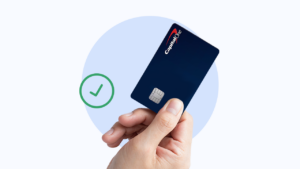How do prescreened credit card offers work?

Key takeaways
- Prescreened credit card offers target qualified consumers based on their credit score, credit utilization, and location.
- Advantages of presecreened offers include saving time when comparison shopping. Disadvantages include increased junk mail and the risk of identity theft.
- You can choose to opt out of prescreened offers.
Prescreened credit card offers allow lenders to identify people who qualify for specific kinds of credit products and extend an offer to them. “[They] are solicitation offers sent to consumers by credit card companies, based on the consumer’s credit score, credit utilization, location and other factors,” explains Leslie H. Tayne, founder of Tayne Law Group in New York.
Credit card companies obtain lists of consumer information from credit bureaus, such as Experian, Equifax and TransUnion, that meet the company’s underwriting criteria for the card.
“Creditors can use information such as a consumer’s ZIP code and credit utilization history to determine whether or not they want to target an individual for a prescreened offer,” Tayne says.
Review the process for how prescreening card offers work, its benefits and downsides and how to opt out if you choose to.
What is a prescreened credit card offer?
Credit bureaus match individuals to lenders’ specifications and provide names and addresses that are used to mail the offer, according to Rod Griffin, senior director of public education and advocacy at Experian, says. Specifications from lenders may include a geographic area where their customers live and credit score ranges that meet their lending criteria. “Using the mailing list generated through prescreening, the lender can then send out a preapproved firm offer of credit to people who meet their criteria,” says Griffin.
As a result, using prescreened lists helps credit card issuers make sure you don’t receive irrelevant offers by avoiding sending offers to consumers who may not qualify for a new account.
Are prescreened offers worth pursuing?
Deciding to pursue a prescreened offer or not will depend on your individual financial situation.
“For example, if you receive a preapproved offer for a credit card with a lower interest rate than a card you currently hold, it may be with pursuing,” Griffin points out.
Similarly, you may receive a prescreened offer for a credit card that offers rewards that are in line with your lifestyle, such as travel or gas points or cash back rewards. It’s important to make an assessment of your spending habits and credit card goals, which could be lower interest rates or a better rewards card.
But tread carefully when accepting prescreened offers — too many lines of credit could lead to overspending.
Pros and cons of prescreened credit card offers
While there are some advantages to receiving pre-screened offers, you should also be aware of the downsides.
Pros
-
Saves time: If you are in the market for a new card, receiving prescreened offers can cut down the time it takes to compare different options.
-
Better rates and offers: You might see competitive interest rates or attractive sign-up bonuses not available to the public on the issuer’s homepage.
-
“Soft pull”: With a prescreened offer, lenders perform a soft inquiry of your credit report which does not impact your score.
-
Improved chances of approval: While still not guaranteed, your chances of approval are typically higher with a prescreened offer.
“Getting a prescreened credit offer also means that if you decide to apply, you’ll likely get approved unless your credit or financial situation changed for the worse between the time the prescreening was done and when you respond to the offer,” Griffin says.
Cons
-
More junk mail: Getting prescreened offers means you’ll receive more unsolicited mail or emails from lenders.
-
Risk of fraud and personal identity theft: While it might be a low risk, your identity could be stolen through database hacks or from personal information on the mailing itself. The QR code typically found on printed prescreened offers could also be used by identity thieves for fraud.
-
Increased debt: If you are struggling with credit card debt, unsolicited prescreened offers might tempt you to get another card and overspend. Opting out of prescreened offers can limit this risk.
-
Less control of credit access: Lenders have limited access to your credit report to generate its offers and mailing lists.
“Under the Fair Credit Reporting Act (FCRA), creditors are permitted to review credit reports to make firm offers of credit. That is done through prescreening,” explains Griffin. If you prefer less eyes on your credit report, you may consider opting out of prescreened offers.
How do prescreened credit card offers impact your credit score?
Receiving a prescreened offer has no impact on your credit score. Griffin says this is because your credit report is accessed as part of the prescreening process, so a “soft” inquiry is all that is performed.
However, when you respond to an offer, a hard inquiry will still be performed to ensure you still meet the issuer’s qualifications. “When you decide to pursue a prescreened offer you received in the mail or your email inbox, you are formally submitting an application for the account and the lender can review your credit report to ensure you still meet the prescreening criteria,” clarifies Griffin. “This will result in a hard inquiry on your credit report, which may cause a minimal, temporary dip in scores.”
The prescreening process, he explains — from the prescreen list creation to the time the lender delivers the offer and the consumer responds — can take as long as several months. “A person’s credit history could change substantially in that time. However, I like to remind people that hard inquiries are the least important factor when determining your credit scores,” says Griffin.
Keep in mind, advises Griffin, if there has been a change in your credit history between the time the prescreened offer was processed and the time you respond, you may not receive the offer as it was originally presented after the lender reviews your credit report. “You may no longer qualify at all, or you may receive different terms than what was originally presented to you,” Griffin adds.
Where to get a preapproved card offer
To find targeted credit card offers in one platform, consider CardMatch™ — Bankrate’s online portal that pairs you with preapproved and other offers tailored to your credit profile, from issuers like Citi, Chase and American Express. Factors like your credit score and debt-to-income ratio will impact your match probability.
Even if your credit score isn’t high, it may still be worth trying to use the tool. After inputting some personal information, including the last four digits of your Social Security number, CardMatch provides consumers with prequalified offers, which increases your approval odds — and might even score you a targeted introductory offer.
Plus, CardMatch won’t impact your credit score.
How to opt out of prescreened card offers
The FCRA provides consumers with the right to opt out of prescreened offers, both regular mail and email offers. You can opt out of prescreened lists prepared by the national credit reporting companies by calling 888-5-OPT-OUT (888-567-8688) or submitting a request online at optoutprescreen.com. Griffin says you only need to submit the request once to be removed from Experian, Equifax, TransUnion and Innovis’ prescreening lists.
“It’s important to note that when you opt out, you may still receive offers for a period of time if there are pending offers in a lender’s delivery stream. It may take three to six months before you stop receiving offers, but you should start to see a decline over time,” he says.
If you change your mind and wish to resume getting offers, simply opt back in by calling the same number. “If you have plans to shop for credit, I recommend ensuring you’re opted back into the system several months in advance of when you plan to apply,” adds Griffin.
Prescreened card offers vs. preapproved card offers
Terms like prescreened, preapproved and prequalified are sometimes all used interchangeably, so it can get confusing.
“Typically, they indicate different degrees of assessment,” says Monica Eaton-Cardone, COO and founder of Chargebacks911. “The use of specific verbiage varies by company and region, so you really need to read the fine print of the offer.”
Normally, she says, a prequalified offer is a less-rigorous assessment, and a preapproved offer is a more rigorous assessment. “Neither are ironclad guarantees of approval, but it means that the credit card company has already analyzed some of the numbers, and it’s statistically probable that you’ll be approved,” Eaton-Cardone continues.
Which issuers offer prescreened card offers?
Many banks send consumers offers both via email and regular mail. However, most banks don’t publicly mention whether they utilize these kinds of offers — though we’ve seen some from major credit card issuers. The scope and amount of offers targeted to consumers are dependent on their credit history, credit score and if they are opted in to receive such offers.
“You might be surprised how many issuers have prescreened card offers,” says Eaton-Cardone. “Almost all of them will snail-mail offers directly to consumers, including Bank of America, American Express, Capital One, Chase, Citibank, Discover, PNC and Wells Fargo.”
The bottom line
Whether you prefer to opt in or opt out of prescreened offers depends on your goals and personal preferences. If you are not in the market for a card, you may not want to wade through the junk mail. But if you are looking to add another card to your wallet, prescreened offers can give you options that best meet your financial needs.
.
Why we ask for feedback Your feedback helps us improve our content and services. It takes less than a minute to complete.
Your responses are anonymous and will only be used for improving our website.






